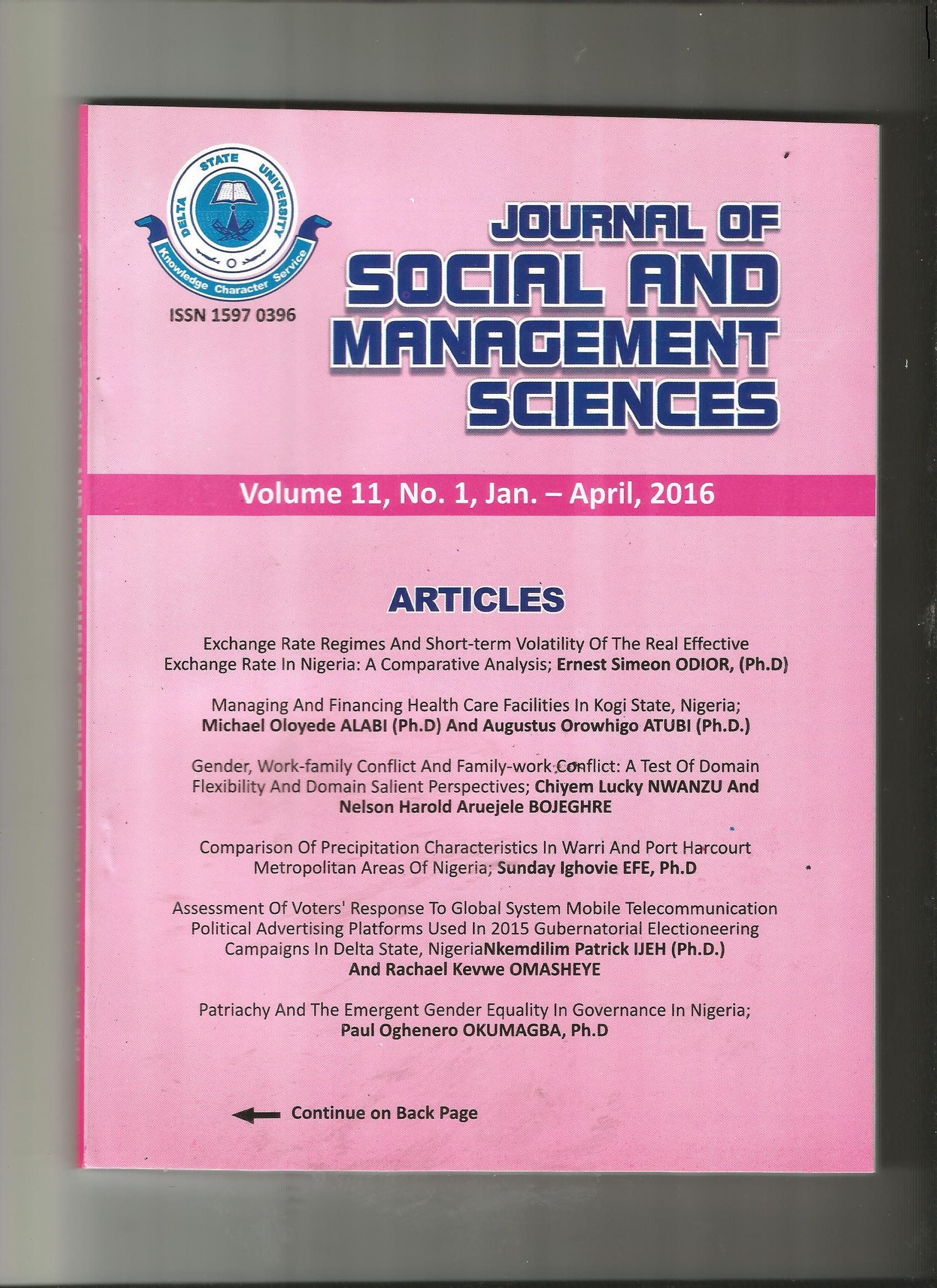
JOURNAL OF SOCIAL AND MANAGEMENT SCIENCES
Journal of the Faculty of Social Sciences, Delta State University, Abraka, Nigeria
ISSN: 1597-0396
DOI: 10.5987/UJ-JSMS
Email: jsms@universityjournals.org
TIME MANAGEMENT ABILITIES AND PRACTICES AMONG MANAGERS: A STUDY OF NIGERIAN TERTIARY INSTITUTIONS
DOI: 10.5987/UJ-JSMS.17.050.3 | Article Number: F677DC9 | Vol.11 (3) - December 2016
Author: ADAGBABIRI Moses
Keywords: Time Management, Self-Management, Tertiary Institution
Time is perhaps the most valuable resource required for any productive activity. Yet, little is known about how well Nigerian executives use their time. How they manage their time has implications for their personal effectiveness and therefore for the national economy. Using a sample of 373 respondents, this case study of a Nigerian University seeks to determine how academic and senior non-academic staff manage their time, how they rate their time management abilities and the extent to which they apply appropriate strategies and tactics recommended by time management consultants and experts. The results show that an overwhelming majority of our respondents rated themselves as good time managers. Yet, the study reveals that; most of them do not have enough time for themselves, their family activities, study, community affairs and recreation, they are usually not able to complete all the items on their daily activity lists by the end of the day, they are not able to find large blocks of time when they need them, they have not been able to get it done. In other words, their claim to good time management is false. The obvious implication is that there is need for training in time management for all executives covered in this study irrespective of sex, age, experience and profession.
Adeoti, J . A (1999) . “ Time management”. Unpublished Article, University of Illorin.
Agboni foh, B.A and Inegbenebor, A.U. (1982).“Time management of corporate TIME MANAGEMENT ABILITIES AND PRACTICES AMONG MANAGERS: A STUDY OF NIGERIAN TERTIARY INSTITUTIONS Moses ADAGBABIRI time”. Management in Nigeria, 18 (5), 10-19.
Agbonifoh, B.A. and Okafor, C.A. (2006). Time management abilities and practices among managers. Nigeria Management Review, 17(1), 15 12-1529.
Akinmayowa, J.T. (1999) “Time and stress management”. Unpublished Article, University of Benin
Blair, G.M (2004) “Personal time management for b u s y m a n a g e r s ” . http://www.sec.ed.ac.uk.gerald/manage mentlart2.html.
Cole, E. (1996). “Time management strategies, between friends time tips for busy moms”, , November, 1996. Douglas and Baker (Undated), Audio Cassette.
Drucker, P. (1967). The effective executive (Pan Books) -
Eade, D.M. (1998).”Time management: five keys to peak performance”. Clinician news, Jan/Feb
Hale, J.M. (2004a). “Time management: Business Vs productivity, between friend Time Tips for busy moms” http://www.betweenfriends.org/articles/time/busyness.htin.http://www.betweenfriends.org/article/time/business.html
Heller, R. and Hindle, T.M. (1989). Essential Manager's Manual London: DorlKinderly
lnegbenebor A.U and Agbonifoh B.A (1985) “Corporate time utilization and Nigerian workers: Some emperical evidence” ASCON Journal of Mnagec 4(2), 12-19
Mankins M.C (2004) “Stop wasting valuable time”. Harvard Business Review, (58-65)
Merrian-Webster (1993). Webster's new encyclopedic dictionary new york: Black Dog and Leventhal Publishers Inc.
Miller, S.W. (2004) “Time management: Six easy tips”. Time tips for busy moms http://www.betweenfriends.org/articles/time/busyness.htm.
Plenty, J. (2004). Time management: 5 ways to kick the procrastination habit.
Procter, P. (1978). Longman dictionary of contemporary english London: Longman Group Limited.
Prokopenko, J. (1992). Productivity management: A practical handbook. Geneva: International Labour Organization.
Tracy, B. (undated). “Time management”, video cassette.
